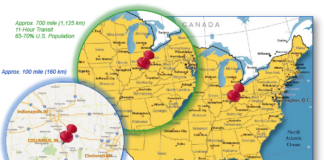By the Business Facilities Staff
From the July/August 2015 Issue

BF: When we met you at the BIO show two years ago, there was some contraction going on in New Jersey’s biotech sector. Is it safe to say that NJ’s biotech industry is expanding in 2015?
KG: It’s more than safe to say that biotech is expanding in New Jersey. The Economic Opportunity Act that we enacted in 2013 targets biotech/pharma and life sciences as key industries, and it’s been very successful. A bio/pharma startup with just 10 employees is eligible. That’s a game-changer.
BF: During the Recession, a lot of the venture capital money that was funding biotech startups dried up. Does NJ have any special programs that fill the gap in this kind of seed funding?
KG: We have an Angel Investor Tax Credit program that provides a tax credit equal to 10 percent of an investment in a small startup company focused on research, manufacturing or technology.
BF: Many states are taking workforce training to the next level by bringing their universities together with businesses to developed specialized curricula. Does New Jersey do that?
KG: We certainly do. A good example is the partnership between Lockheed Martin and Rowan University, who are collaborating on innovative technologies and training of future engineering professionals. Lockheed actually comes in and teaches some of the classes, preparing our students to become the engineers and aerospace workers of the future.
BF: Does NJ offer any dual-credit programs that permit high school students to earn college credits while they’re still in high school?
KG: Gov. Christie has initiated a program that lets high school juniors and seniors train at a local community college and get dual credits, earning community college credits while they’re earning their high school diploma—credits that are valid for an Associate’s Degree in college. I recently attended a Cumberland County (NJ) Community College graduation at which students were receiving their two-year Associate’s Degree at the same time they were graduating from high school. Another example is Brookdale Community College, which is partnering with [utility] JCP&L to let high school students earn a degree in electronics. They won’t guarantee them a job, but if these students achieve a certain grade-point average and there is an appropriate opening, they will be hired. When this program was announced, they had 500 people show up for 425 spots.
BF: Are any businesses in New Jersey training high school students in skills they can use if they don’t go to college?
VH: BMW has partnered with a high school in Bergen County to teach students how to fix a BMW. That student, when he or she graduates, will be able to repair an advanced vehicle. Within 25 miles of this school, there are about 4,000 jobs of this type available, each paying $40,000 annually.













![[VIDEO] Get More for Your Business in Ardmore. Oklahoma](https://businessfacilities.com/wp-content/uploads/2024/02/maxresdefault-324x160.jpg)
